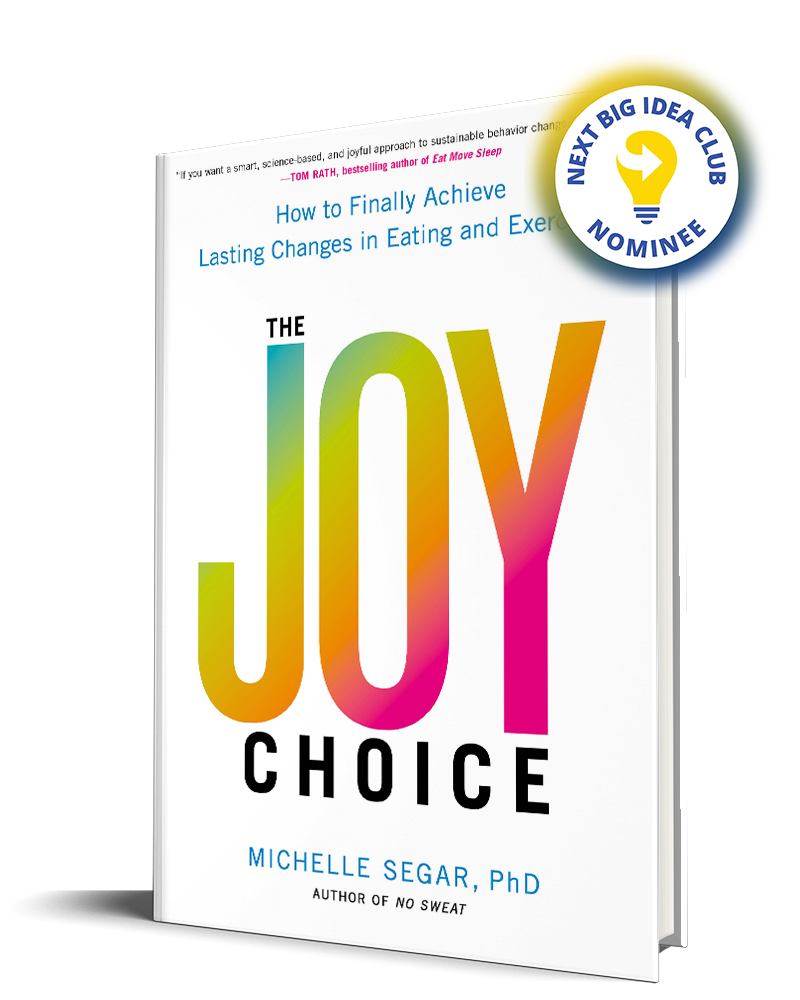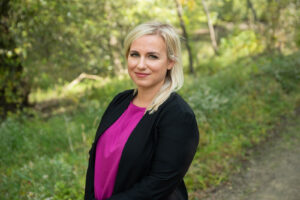Have you ever worked hard at eating healthier and exercising more, but, after a week or two, something happens that throws your plans out the window?
Michelle Segar, PhD, MPH, MS, a sustainable behavior change scientist and director of the University of Michigan’s Sport, Health and Activity Research and Policy Center, wanted to explore why this happens and what could be done about it. Her new book, “The Joy Choice: How to Finally Achieve Lasting Changes in Eating and Exercise,” challenges readers to adjust their way of thinking when it comes to creating sustainable and healthy change.
“I’ve been studying why people don’t sustain self-care behaviors like physical activity for almost 30 years,” explains Segar. The impetus behind Segar’s interest in this topic came from a study she conducted of cancer survivors approximately four years past treatment. The study was to determine if exercise could reduce feelings of depression and anxiety. One group of survivors was randomized to exercise, and the other was a control group.
“What we found was that the group that exercised significantly improved in the measures, compared to the group that didn’t exercise. But that really wasn’t the big ‘aha’ moment,” says Segar. “The big ‘aha’ moment came when we found that almost everyone had stopped exercising when our study had ended. I thought, wow, if people had felt comfortable committing to exercise [to] participate for our research, but they didn’t feel comfortable prioritizing their own self-care once the study ended, then we have a big problem in society,” she says. “That was my light bulb moment that launched me into wanting to understand.”
Segar emphasizes how this discovery showed her the power of cultural norms when it comes to taking care of ourselves. “I thought, if people who had already faced a debilitating and potentially life-threatening illness had difficulty prioritizing their self-care after our study ended, [then] this speaks to our culture and the messages we get about what’s the most important thing we should be spending our time on,” she says. “Clearly our culture is saying [that] it is not our self-care.” She wanted to create something that would explore how to help people prioritize their self-care in a way that would embrace both success and failure.
Segar’s first book, “No Sweat,” compounds years of research into a helpful guide explaining the science behind motivation, so that exercise will become a mindset, not a chore. “No Sweat” led Segar into learning more about in-the-moment decision making. “The Joy Choice” offers readers insight into why society has made us feel as if healthy eating and exercise must be an all-or-nothing mentality.
“I decided that we needed to reframe and rebrand the choices that most of us have to make to keep us on the path of lasting change,” says Segar. She details a new way of thinking in her book, where there is always an “imperfect-perfect choice” that lets us do something instead of nothing.
Segar wanted the book to be a program for readers to follow to help with decision making in a way that was easy to understand. “The research supports the whole premise of the book, which is that the value of any choice to exercise or eat in healthy ways is going to be determined by the other choices and needs in the moment that we had planned to make that choice,” Segar says.
She created a decision tool in her book, called POP, that lets the readers “pop” their plans and choose to do something instead of nothing. Whether it’s going on a 30-minute walk or dancing in the kitchen for five minutes when you unexpectedly have to miss that morning workout class, Segar wants people to know there is always an imperfect-perfect choice that can keep you moving and healthy, even when plans change.
The value of any choice to exercise or eat in healthy ways is going to be determined by the other choices and needs in the moment that we had planned to make that choice.
“In life, there’s all this unexpectedness, and that usually derails people from doing anything, because they go, ‘If I can’t do what I planned to do, it’s not worth doing at all.’ Well, that is the recipe for feeling bad about yourself, [having a] sense of failure, not being motivated — just a whole host of mostly very negative things,” Segar says. “The alternative to that, which science supports, is that if you do something instead of nothing when your plan is being derailed for circumstances that are outside of your control, you will actually feel better about it.”

Segar points out that in other areas of life outside of eating and exercise, such as schoolwork, parenting or relationships, we don’t expect it to be perfect all the time. But when it comes to eating healthily and exercising, we do. “We know we could never live our lives in perfect ways,” says Segar. “We know we can’t be perfect parents [or] partners, because that’s not the nature of living,” she says. “It’s time for society to reframe. It’s time for us to give ourselves permission, and it’s time for society to follow suit.”







